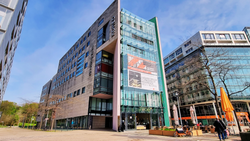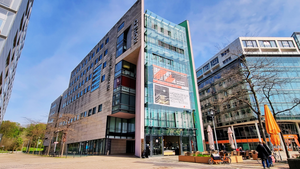Karl Blossfeldt - Photographie im Licht der Kunst
In the organizer's words:
With 271 original prints, the oeuvre of Karl Blossfeldt (1865-1932) is being presented in this scope for the first time in two decades. An impressive photographic oeuvre unfolds, which was created in the context of art education and was only discovered as an independent artistic approach a few years before Blossfeldt's death. Today it ranks among the classics of photographic history and is mentioned in the same breath as August Sander and Albert Renger-Patzsch. In terms of reception, Blossfeldt's photographs are regarded above all as prototypical of New Objectivity and New Vision.
The exhibition is based on the holdings of the Berlin University of the Arts, at whose predecessor school Blossfeldt himself trained as a sculptor and where he taught the subject of "modeling after plants" for three decades from 1899. It was there that he created his plant photographs, which he used as models to teach his students about the variety of forms and details of the botanical world. The precise observation and artistic realization of vegetal forms were to serve as inspiration for designs in the field of applied art and architecture. Blossfeldt also made bronze casts of plant forms - albeit in smaller numbers - and used them in class. Exemplary pieces are included in the presentation, as are handwritten letters that provide insights into school processes and contain statements on the relationship between natural and artistic forms.
Photography was an elementary means of expression for Karl Blossfeldt, which he used specifically for his own purposes. He photographed the plant material, some of which was heavily processed, in multiple enlargements and against a neutral background of light or dark tones. The photographs are of great formal power and, beyond their function as teaching pieces, formulate a pictorial language that departs from the representational and leads to abstraction. In particular, Blossfeldt's publications "Urformen der Kunst" (1928) and "Wundergarten der Natur" (1932), which appeared during his lifetime, show how intensively he explored his subject area and how much he valued the aesthetic expressive possibilities of plants and their enigmatic, magical aura.
A comprehensive catalog presenting the Berlin Blossfeldt collection will be published. The publication and exhibition are based on the long-standing cooperation between the Berlin University of the Arts and the Photographische Sammlung/SK Stiftung Kultur, Cologne.
____________________
Public guided tours every Sunday at 3 pm
Guided tours for children (6-10 years) "The Photo Detectives" on October 5, November 9 and December 7, 3-4:30 p.m.
Free admission on the first Thursday of the month from 2pm to 9pm!
Opening hours: daily except Wednesday 2-7 pm
Closed: November 1, December 24/25/26/31 and January 1, 2025
Location
Organizer
Organizer | Event Series
Organizer















